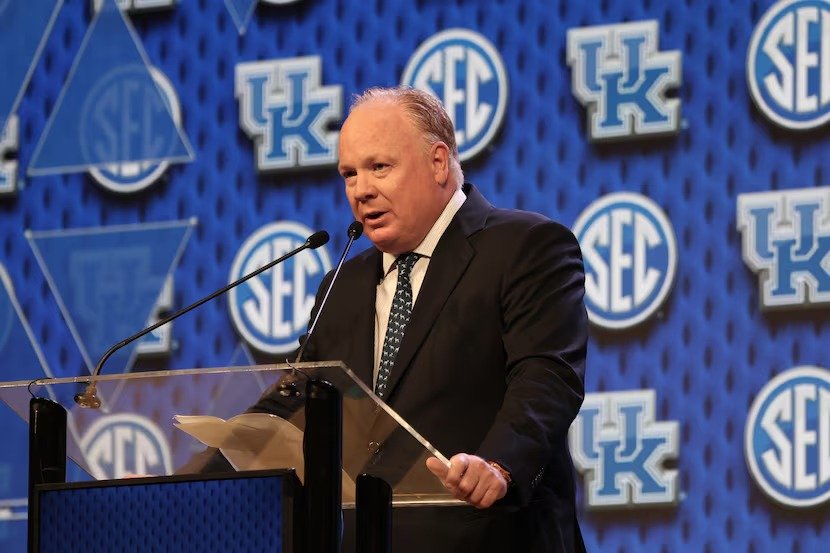🚨 NEWS UPDATE: Despite continued speculation, Mark Stoops has rejected a new contract offer from the Kentucky Wildcats football program. The decision has sent shockwaves through the college football community, with fans, analysts, and insiders speculating about the reasons behind this move. Stoops, who has been a cornerstone of Kentucky football for over a decade, turned down the offer amid ongoing uncertainty about the direction of the program and what this means for his future and that of the team.
Mark Stoops has been synonymous with Kentucky football, transforming the program into a competitive force in the Southeastern Conference (SEC). Under his leadership, the Wildcats have consistently punched above their weight in one of the most challenging conferences in college football. His ability to recruit effectively, develop players, and create a tough, resilient team culture has made him one of the most respected coaches in the nation. For many, Stoops’ long-term association with Kentucky seemed almost unbreakable, making his rejection of a new contract even more surprising.
While details surrounding the rejected offer remain under wraps, several factors might have contributed to Stoops’ decision. One possible explanation is dissatisfaction with the terms of the proposed deal. Kentucky’s administration has often faced criticism for not committing enough resources to its football program compared to other SEC schools. Facilities, coaching staff budgets, and player support infrastructure are areas where the Wildcats have occasionally lagged behind their competitors. If Stoops felt that the offer did not include the necessary commitments to elevate the program further, it could have been a significant factor in his decision.
Another potential issue might be related to Stoops’ ambitions and career trajectory. After achieving considerable success at Kentucky, it’s possible that he is looking for a new challenge. Over the years, Stoops’ name has frequently been linked to high-profile coaching vacancies across college football. With his reputation as a program-builder and defensive mastermind, he is often seen as an ideal candidate for larger programs with championship aspirations. Rejecting the Kentucky offer could be a sign that he is preparing to explore other opportunities, either in college football or potentially even in the NFL.
The timing of the decision is also intriguing, given the broader context of college football. The sport is undergoing significant changes, with the expansion of the College Football Playoff, the increasing influence of NIL (Name, Image, and Likeness) deals, and the transfer portal revolutionizing how teams are built and sustained. Navigating these changes requires strong institutional support, clear strategies, and alignment between the coaching staff and administration. If Stoops felt that Kentucky was not fully equipped to compete in this evolving landscape, it might have influenced his choice to move on.
The rejection of the contract has left Kentucky in a state of uncertainty. Stoops’ decision raises questions about the program’s immediate future, including its ability to retain current players and attract recruits. His departure would create a leadership void that would be difficult to fill, given his unique connection to the team and the progress he has made during his tenure. For players who committed to Kentucky because of Stoops, this news could prompt reconsideration of their futures, especially in an era where transferring has become much easier.
Fan reaction to the announcement has been a mix of shock, disappointment, and speculation. Kentucky fans have long admired Stoops for his dedication and the stability he brought to a program that had often struggled for relevance in the SEC. Social media platforms have been flooded with messages of support for the coach, alongside frustration at the program’s inability to secure his continued services. Many fans are demanding answers from the administration, calling for greater transparency about what went wrong in the negotiations and what steps will be taken to address the fallout.
Meanwhile, analysts have begun to discuss the implications of Stoops’ decision for the broader college football landscape. His availability could trigger a domino effect in the coaching carousel, with multiple programs likely to express interest in his services. Schools that are currently underperforming or are in the market for a proven coach could see Stoops as the ideal candidate to turn their fortunes around. This could lead to a bidding war, further complicating Kentucky’s chances of retaining him or quickly finding a suitable replacement.
At the same time, the rejection of the contract could also serve as a wake-up call for Kentucky’s administration. Stoops’ tenure has shown that the Wildcats can compete at a high level, but sustained success requires consistent investment and a willingness to adapt to the changing dynamics of college football. If the administration fails to address these issues, it risks undoing much of the progress made under Stoops and falling back into mediocrity.
For Stoops, this decision marks a pivotal moment in his career. He has often spoken about his love for Kentucky and the relationships he has built there, making this rejection a testament to the complexities of modern coaching. Whether his next step involves taking on a new challenge at a different school, exploring opportunities in professional football, or even taking a break from coaching, Stoops’ legacy at Kentucky is already secure. He will be remembered as the coach who brought stability, respectability, and competitiveness to a program that had long been overshadowed by its SEC rivals.
As the dust begins to settle, the focus now shifts to what comes next. For Kentucky, the priority will be to stabilize the program and reassure players, recruits, and fans that the Wildcats remain committed to competing at the highest level. This could involve making a renewed effort to retain Stoops or pivoting quickly to identify and secure a new head coach. The administration will also need to address the underlying issues that may have contributed to this situation, ensuring that Kentucky remains an attractive destination for top-tier coaching talent.
For Stoops, the future is filled with possibilities. His track record of success at Kentucky makes him one of the most sought-after coaches in the sport, and his decision to reject the contract suggests that he is confident in his ability to find a new opportunity that aligns with his goals and values. Wherever he ends up, Stoops will bring with him the experience, resilience, and vision that have defined his career.
In the end, the rejection of the Kentucky contract is not just a story about one coach and one program—it is a reflection of the evolving challenges and dynamics of college football. As the sport continues to change, the decisions made by coaches, administrators, and players will shape the future of programs and the broader landscape of the game. For Kentucky, this moment represents a crossroads, and the choices made in the coming weeks and months will determine whether the Wildcats can build on the foundation laid by Stoops or face a period of rebuilding and uncertainty.

 Blog2 months ago
Blog2 months ago
 Blog3 months ago
Blog3 months ago
 Blog3 months ago
Blog3 months ago
 Blog2 months ago
Blog2 months ago
 Blog7 months ago
Blog7 months ago
 Blog1 month ago
Blog1 month ago
 Blog2 months ago
Blog2 months ago
 Blog3 months ago
Blog3 months ago
